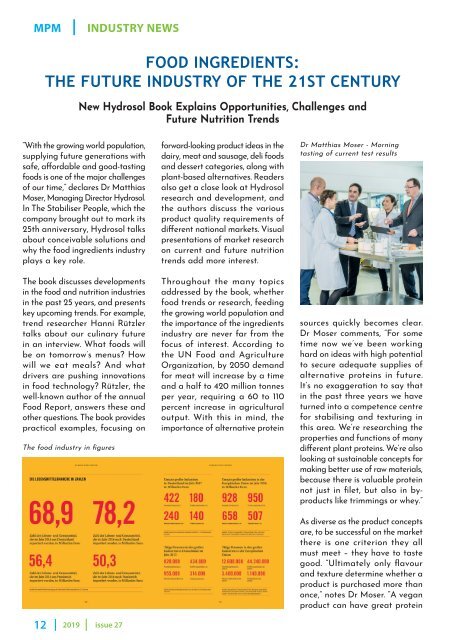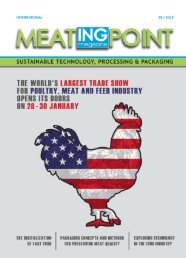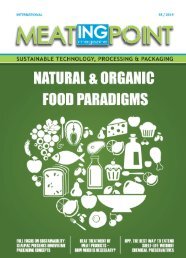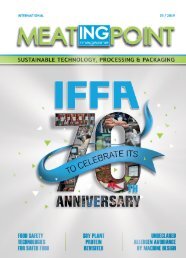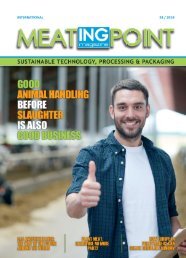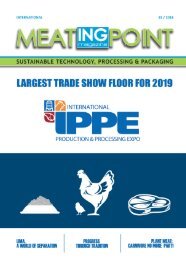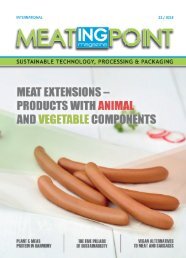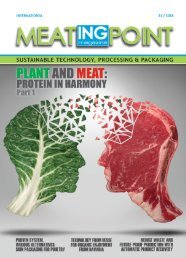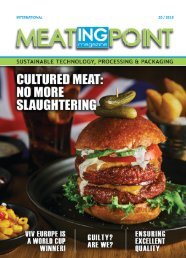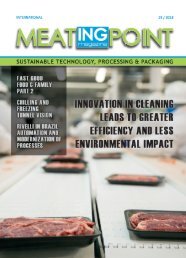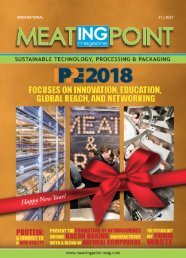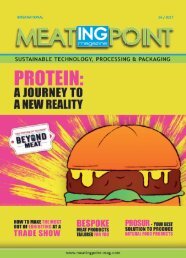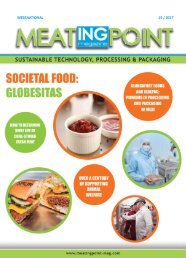MEATing POINT Magazine: #27 / 2019
Create successful ePaper yourself
Turn your PDF publications into a flip-book with our unique Google optimized e-Paper software.
MPM<br />
| INDUSTRY NEWS<br />
FOOD INGREDIENTS:<br />
THE FUTURE INDUSTRY OF THE 21ST CENTURY<br />
New Hydrosol Book Explains Opportunities, Challenges and<br />
Future Nutrition Trends<br />
“With the growing world population,<br />
supplying future generations with<br />
safe, affordable and good-tasting<br />
foods is one of the major challenges<br />
of our time,” declares Dr Matthias<br />
Moser, Managing Director Hydrosol.<br />
In The Stabiliser People, which the<br />
company brought out to mark its<br />
25th anniversary, Hydrosol talks<br />
about conceivable solutions and<br />
why the food ingredients industry<br />
plays a key role.<br />
The book discusses developments<br />
in the food and nutrition industries<br />
in the past 25 years, and presents<br />
key upcoming trends. For example,<br />
trend researcher Hanni Rützler<br />
talks about our culinary future<br />
in an interview. What foods will<br />
be on tomorrow’s menus? How<br />
will we eat meals? And what<br />
drivers are pushing innovations<br />
in food technology? Rützler, the<br />
well-known author of the annual<br />
Food Report, answers these and<br />
other questions. The book provides<br />
practical examples, focusing on<br />
The food industry in figures<br />
12 | <strong>2019</strong> | issue 27<br />
forward-looking product ideas in the<br />
dairy, meat and sausage, deli foods<br />
and dessert categories, along with<br />
plant-based alternatives. Readers<br />
also get a close look at Hydrosol<br />
research and development, and<br />
the authors discuss the various<br />
product quality requirements of<br />
different national markets. Visual<br />
presentations of market research<br />
on current and future nutrition<br />
trends add more interest.<br />
Throughout the many topics<br />
addressed by the book, whether<br />
food trends or research, feeding<br />
the growing world population and<br />
the importance of the ingredients<br />
industry are never far from the<br />
focus of interest. According to<br />
the UN Food and Agriculture<br />
Organization, by 2050 demand<br />
for meat will increase by a time<br />
and a half to 420 million tonnes<br />
per year, requiring a 60 to 110<br />
percent increase in agricultural<br />
output. With this in mind, the<br />
importance of alternative protein<br />
Dr Matthias Moser - Morning<br />
tasting of current test results<br />
sources quickly becomes clear.<br />
Dr Moser comments, “For some<br />
time now we’ve been working<br />
hard on ideas with high potential<br />
to secure adequate supplies of<br />
alternative proteins in future.<br />
It’s no exaggeration to say that<br />
in the past three years we have<br />
turned into a competence centre<br />
for stabilising and texturing in<br />
this area. We’re researching the<br />
properties and functions of many<br />
different plant proteins. We’re also<br />
looking at sustainable concepts for<br />
making better use of raw materials,<br />
because there is valuable protein<br />
not just in filet, but also in byproducts<br />
like trimmings or whey.”<br />
As diverse as the product concepts<br />
are, to be successful on the market<br />
there is one criterion they all<br />
must meet – they have to taste<br />
good. “Ultimately only flavour<br />
and texture determine whether a<br />
product is purchased more than<br />
once,” notes Dr Moser. “A vegan<br />
product can have great protein


